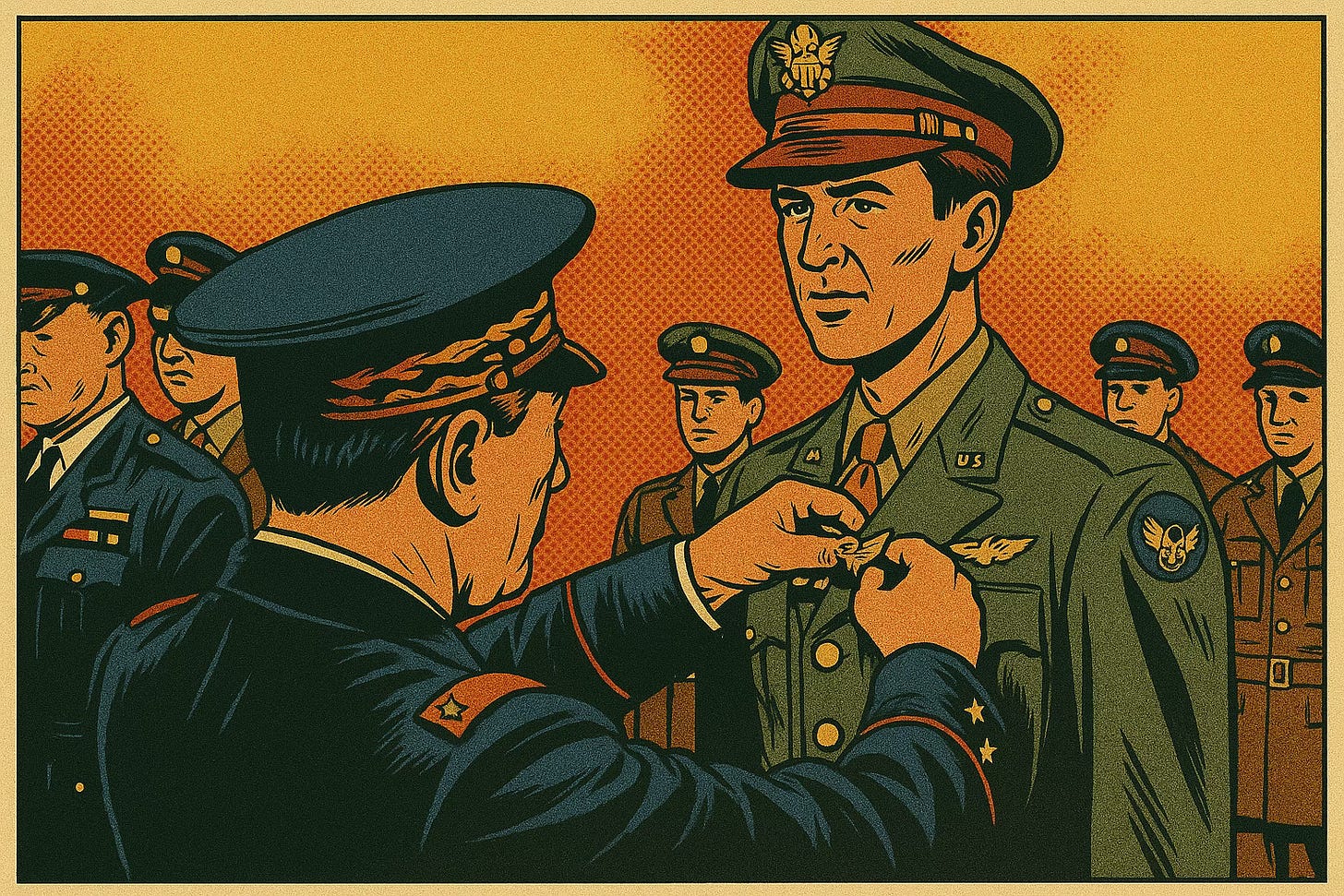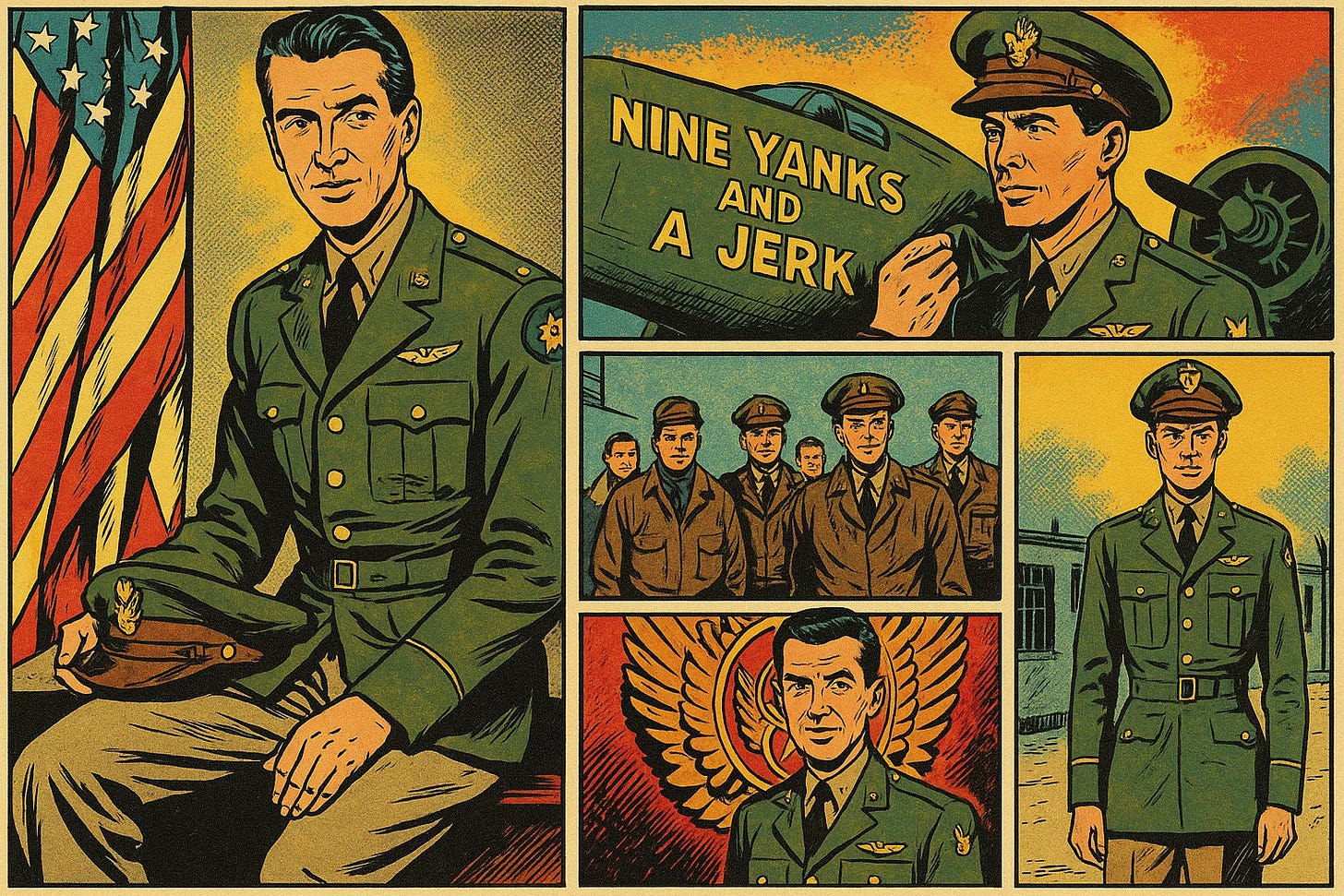The Prayer Was Real: Jimmy Stewart’s Hidden Battle Behind It’s A Wonderful Life
He flew bombing runs over Nazi Germany, then came home to play George Bailey. What no one knew: Jimmy Stewart’s prayer at the bar wasn’t fiction. It was survival.

The Prayer Behind the Camera
I saw It’s A Wonderful Life for the first time in May, not December. 1986. My siblings and I had just returned from Germany. My grandparents had one VHS tape. That was it. So we watched George Bailey over and over, not knowing that we were absorbing something more than a movie. We were witnessing a man’s reckoning. And we didn’t know it.
My mother wrote Jimmy Stewart to thank him. He wrote back. I still have the note. It felt miraculous then. It feels sacred now.
Because now I understand what we were really watching.
The Suffering We Didn’t See
Jimmy Stewart didn’t play George Bailey. He was George Bailey. Not because of his acting talent, though he had that in spades. Not because he understood the American middle-class everyman, though he was that. But because Jimmy Stewart came home from the war carrying ghosts.
He flew over 20 combat missions over Nazi Germany as a bomber commander. He didn’t just witness horror. He ordered it. He carried the burden of every life taken, every friend lost, every moral question left unanswered at 25,000 feet.
When he came home, Hollywood didn’t welcome him with confetti. He was gaunt. Haunted. Wrung out. He’d disappeared for five years and came back changed. Studio execs saw a liability. Frank Capra saw something else. He saw a man with real pain.
A man who could carry George Bailey’s descent into despair because he didn’t have to imagine it. He lived it.

The Prayer Was Real
Watch that scene at Martini’s bar again.
Stewart, hands clasped, eyes trembling, asks God for help. Voice cracking. He’s not acting. That’s not character. That’s confession.
He’s not praying as George Bailey. He’s praying as Jimmy Stewart. For his men who didn’t come home. For the ones who did and never felt whole again. For himself. For some kind of meaning.
The miracle of that scene isn’t cinematic. It’s sacramental. A man found a way to mourn in public without anyone realizing it. He bled in plain sight, and audiences called it brilliance.
They still do.

The Pattern We’ve All Missed
This isn’t about nostalgia. This is about the way American culture insists on packaging pain inside palatable frames. We slap a bow on trauma. We call it “heroism.” But underneath, many are still praying at the bar, quietly begging God for a reason to keep going.
I’ve known that prayer. I’ve seen it in the eyes of friends who fought in Iraq, Afghanistan; even peers of the older generations from WWII, Korea and Vietnam. I’ve seen it in men and women who jump at fireworks. In the ones who won’t ride elevators. In the ones who check the corner of every room before stepping inside. In the ones who drank too much, numbed too hard, or left too soon.
Their trauma doesn’t dress itself up. It hides. Until one day it leaks through in a laugh, a silence, or a breakdown mistaken for acting.
That’s why Stewart’s performance still crushes me. Because it isn’t performance. It’s release. It’s what real courage looks like when it’s run out of options.
The World Still Doesn’t See
Hollywood sells images. But it missed what it had in Stewart. It cast him as the everyman. But he wasn’t every man. He was one of the few who saw hell and came back trying to turn it into light.
He didn’t talk about PTSD. That vocabulary didn’t exist yet. He didn’t whine. He didn’t cash in. He just kept praying, through his roles, through his silence, through his presence.
And in doing so, he showed something we desperately need now:
That the wounds we carry don’t have to become the end of us.
They can become the frame.

The Hope That Hides in Plain Sight
Since learning all of this I never watch It’s A Wonderful Life the same way again. Not now. Not knowing that Stewart’s “Merry Christmas” was probably a scream of survival. That his collapse on that bar stool was a man breaking open for real, and the world applauded because it looked like acting.
It wasn’t.
It was grief. Love. Guilt. Maybe even faith.
And if he could transform that into something as timeless as George Bailey, then maybe the rest of us can find our way, too.
Maybe you’re not starring in a timeless holiday classic. But maybe you’re finding your own version of that prayer, on a walk, in a letter, in a song no one hears but you.
That’s how we carry on.
That’s how we reorient.
Not by ignoring the pain, but by giving it form.
There are prayers happening all around you. Some look like breakdowns. Some look like silence. Some are hiding inside black-and-white films from 1946.
Pay attention. They matter.
And if you’re one of the ones praying, carry on.
You’re not alone.
And yes, despite it all:
It’s a wonderful life!!!





Man. Going to have to watch again soon through this lens. Great post.